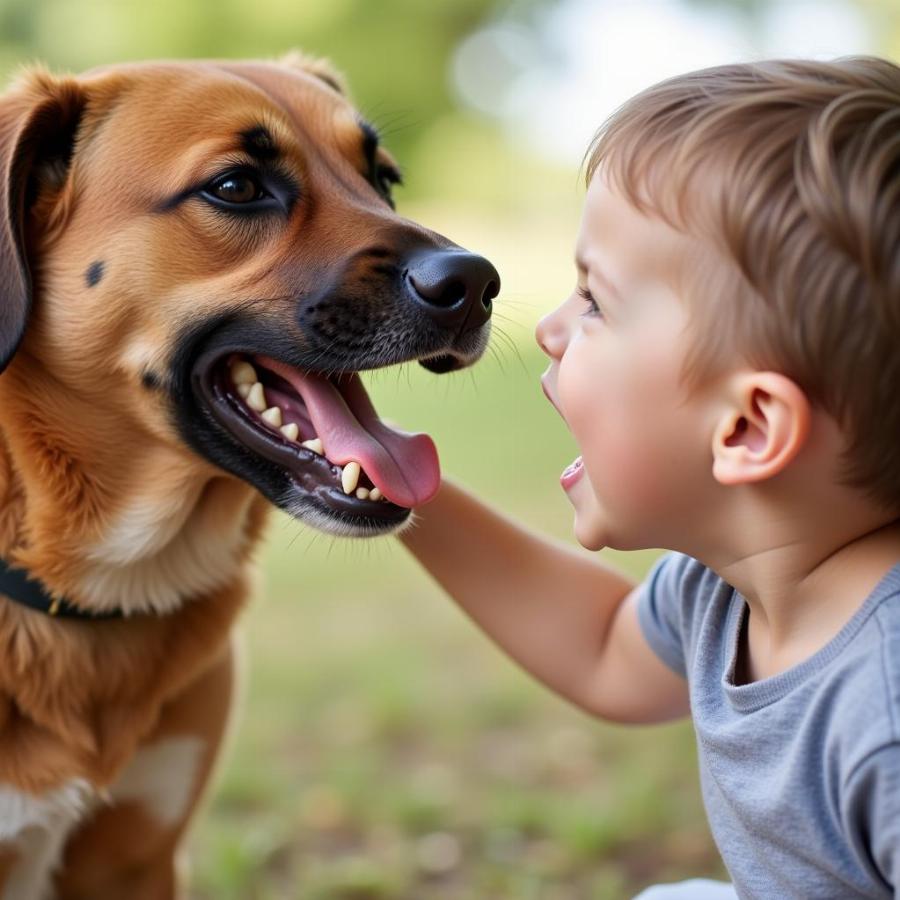Being a dog owner comes with immense joy, but also a great deal of responsibility. One of the most challenging situations a dog owner can face is their dog biting, especially when the bite victim is their own child. This experience can be terrifying and heartbreaking, leaving you feeling lost and unsure of what to do next.
If your dog has bitten your child, it’s crucial to act quickly and decisively. This article will guide you through the immediate steps to take, provide insights into why dogs bite, and offer advice on how to prevent future incidents. Remember, while this information is designed to be helpful, it is not a substitute for professional advice. Always consult with a veterinarian and a certified dog behaviorist to address your dog’s specific needs.
Immediate Actions After a Dog Bite
1. Safety First: Separate your dog from your child immediately. This is not a time for punishment, but for ensuring everyone’s safety.
2. Tend to Your Child: Assess the severity of the bite. Clean the wound thoroughly with soap and water, apply an antibiotic ointment, and cover it with a sterile bandage.
3. Seek Medical Attention: Even if the bite appears minor, consult a doctor immediately. Dog bites can lead to infections and other complications.
4. Document the Incident: Note the date, time, and circumstances surrounding the bite. This information will be helpful for medical professionals and any behavioral experts you consult.
Understanding Why Dogs Bite
Dogs bite for various reasons, and it’s rarely out of pure aggression. Understanding the underlying causes is crucial for preventing future incidents.
Common Triggers:
- Fear: Dogs may bite when they feel threatened or scared, especially in unfamiliar situations or when cornered.
- Pain or Illness: A dog in pain might bite to protect itself, even if the interaction seems innocent.
- Resource Guarding: Some dogs become possessive over food, toys, or even specific people, leading them to bite if they perceive a threat to these resources.
- Predatory Instincts: While domesticated, dogs still possess instincts that can trigger biting, particularly when children are moving quickly or making high-pitched noises.
 Dog biting child out of fear
Dog biting child out of fear
Preventing Future Bites
Preventing dog bites is an ongoing process that requires commitment and consistency.
Key Strategies:
- Socialization: Expose your dog to various sights, sounds, people, and especially children, from a young age. Positive experiences are crucial for raising a well-adjusted dog.
- Training: Enroll your dog in obedience classes. Training provides mental stimulation and teaches your dog essential commands like “leave it,” “drop it,” and “stay,” which can be invaluable in preventing bites.
- Supervision: Never leave young children unsupervised with any dog, regardless of breed or temperament.
- Recognize Body Language: Learn to read your dog’s cues. Signs like yawning, lip licking, whale eyes (showing the whites of their eyes), and a tucked tail can indicate stress or anxiety.
- Seek Professional Help: If you notice any concerning behaviors, don’t hesitate to consult a certified dog behaviorist. Early intervention is crucial for correcting problem behaviors.
Addressing the Emotional Impact
A dog bite can be traumatic for everyone involved, including the child, the parents, and even the dog.
Moving Forward:
- Reassurance and Support: Offer your child plenty of reassurance and comfort. Help them process the event and rebuild trust in a safe and supportive environment.
- Professional Guidance: Consider seeking professional help from a child psychologist or therapist if your child is struggling to cope with the experience.
- Evaluate Your Options: After a bite incident, it’s essential to carefully assess the situation and make responsible decisions regarding your dog’s future. This may involve consulting with a veterinarian, a certified dog behaviorist, and your family to determine the best course of action for everyone’s safety and well-being.
Remember, while a dog bite is a serious event, it doesn’t necessarily mean the dog is inherently aggressive or dangerous. With the right support, education, and professional guidance, you can navigate this challenging situation and work towards a safer environment for both your child and your furry companion.
FAQs:
Q: What should I do if a stray dog bites my child?
A: Contact animal control immediately. It’s crucial to locate the dog to assess its health and vaccination status, especially for rabies.
Q: My dog has never shown aggression before. Could this be a one-time incident?
A: While some dogs may bite only once, it’s essential to take any bite seriously. Consult with a veterinarian and a certified dog behaviorist to determine the underlying cause and develop a plan to prevent future incidents.
Q: Can I train an older dog to stop biting?
A: While it can be more challenging to modify behaviors in older dogs, it’s not impossible. Working with a qualified professional is crucial for developing a safe and effective training plan.
Need More Help?
We understand that dealing with a dog bite can be incredibly stressful. If you need further assistance or have more questions, please reach out to us at [email protected].
Beaut Dogs is your trusted resource for all things dog-related. We provide expert advice, helpful tips, and a supportive community to help you navigate the joys and challenges of dog ownership. Visit https://beautdogs.com today to learn more!